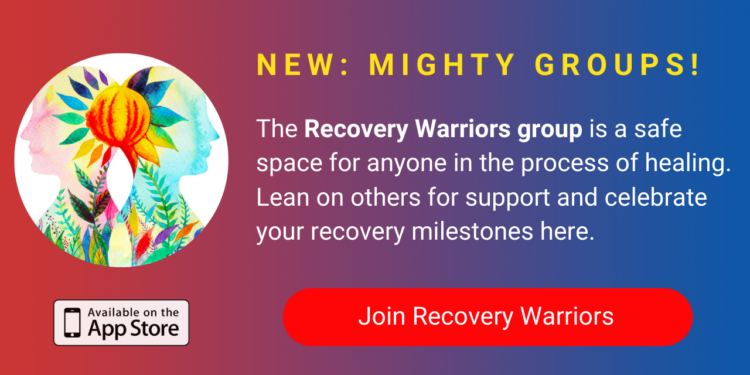The Connection Between My Sexual Trauma and Eating Disorder
Editor's Note
If you’ve experienced sexual abuse or assault, the following post could be potentially triggering. You can contact The National Sexual Assault Telephone Hotline at 1-800-656-4673.
I like answers. I like having answers and I don’t like unknowns. Like most humans, I get frustrated when I don’t know the answer. One of the biggest questions in my reality lately is, what causes an eating disorder? I believe that sometimes, if I know what causes something then it’s a little easier to determine a solution. But the thing with eating disorders is there isn’t one cause. No one answer for its development. There are many components that when added together create the perfect storm.
Through my recovery, I have been exploring the contributing factors leading to me developing anorexia in high school. Without going into a long list, I wanted to discuss one of the biggest contributors and that is sexual trauma.
I did some research and found a few articles discussing the prevalence of eating disorders in survivors of various forms of sexual trauma. In an article written by Laura Palumbo on the National Sexual Violence Resource Center blog, she stated,
“Many of the challenges survivors face place them at greater risk for developing an eating disorder. Research shows trauma and post-traumatic stress disorder (PTSD) are significant risk factors for the development of an eating disorder. Sexual traumas such as rape, molestation, harassment, and other forms of abuse, can all be catalysts.”
Further, an article on the National Eating Disorders Association website states,
“’Traumatic experiences, especially those involving interpersonal violence[such as sexual assault], have been found to be a significant risk factor for the development of a variety of psychiatric disorders, including eating disorders, particularly those characterized by bulimic symptoms, such as binge eating and purging,’ says Dr. Timothy Breweton, an expert in the field of trauma and eating disorders.”
There has been quite a lot of research showing that there is a correlation between sexual trauma and eating disorders. Now, this is a topic I still struggle to talk about and open up about. I don’t wish to describe full details nor do I wish to describe the doubt and denial I still feel, but I do wish to list some of the experiences that, in part, led to and continued my eating disorder.
There’s really no easy way to start so I think I’ll just say it outright. In high school, I was lied to and tricked into having oral sex when I wasn’t ready. I was begged and manipulated and coerced into having sex after repeatedly saying no. I was later told I was disgusting for having had oral sex with someone. I had my head pushed into a boys crotch because he wanted oral but he was just “joking.” I was broken up with because I wasn’t physical enough after a month of dating. I was asked why I let myself get so drunk after a “friend” tried to stick his hand up my shorts. There were a few other experiences, but these are the ones that stand out most.
For a long time, I didn’t really see the connection between these experiences and my ED. I was trying to connect the dots but kept falling short. But, over time, I started seeing it, I started exploring my emotions and the connections became increasingly clearer. My experiences with sexual manipulation and for me, trauma, left me feeling guilty, ashamed, unsafe, completely disconnected from my own body, unable to trust, powerless, out of control, undeserving and worthless. Once I accepted and began working through these emotions, I was able to start drawing some lines between the dots.
Dot numbers 1 and 2. I felt guilt and shame. Even though the things that happened to me were in no way my fault, I felt that guilt and shame. When my ED first started, I remember it was innocently. It began with cutting out those “unhealthy” foods. The foods that, in our society, are labeled as bad and I went with the foods that were labeled as “guilt free.” It kind of clicked randomly one day. The emotions I was feeling as a result of sexual trauma were now being applied to the food I was eating. I felt overwhelming guilt for what happened to me and now I was being told that if I ate “X,” I was bad or should feel guilt too. I wanted to avoid more guilt so I cut out as many sources that would cause me guilt as I could and eventually this led to barely eating at all.
Dot numbers 3 and 4. In a way, I blamed my body for what happened. My body felt foreign and dirty. I stopped trusting it. I wanted to be completely separate from it. I wanted to change it. And then the noise from diet culture told me that I could change it by exercising and eating “right.” As I said, it started innocently, but then my body started changing and people complimented my weight loss and my “discipline.” I felt this sense of control that I hadn’t felt in so long. I could control my body, this thing that I thought I no longer had any control over. It became intoxicating. I was “in control” and I was disciplining my body for what had happened. I was punishing myself for events that were not my fault. But I kept going, I couldn’t stop. I ignored my body. I ignored it telling me that it didn’t have the energy to keep me warm and ignored the extra hair it grew to try and compensate. I ignored the dizziness and lightheadedness because I hadn’t eaten anything that day. I ignored the brain fog where I couldn’t think straight or remember much. I ignored the aches and pains in my joints. I ignored my body because I didn’t want to be with it. I wanted to be completely separate from it until it changed to the point of being unrecognizable. I wanted to control it because I needed to feel control.
Dot numbers 5 and 6. When you hate your body, when you feel like you’re at fault for the negative experiences, when you feel dirty, you lose your sense of self-worth. You lose respect for yourself. You lose any ounce of liking for yourself. I felt worthless, undeserving, ugly and alone. I wanted to love myself. I wanted to feel like I was worth something. I wanted to feel good enough. Cue diet culture telling me that the way to do that was to have the perfect body. So, I’ll say one more time, it started innocently. Then the compliments came in. The “I wish I looked like you” comments. The “you look amazing!” The “I wish I had your body.” I was being noticed. People liked the way I looked, some even wanted to look like me. So I kept going, but as I kept going I couldn’t stop. I was still searching for that self-love and I kept thinking maybe just a few more pounds. Maybe just a few more gym sessions. Maybe just a few more skipped meals. But I couldn’t find it. I couldn’t find my happiness or my worth or my enoughness. I just couldn’t find it, no matter how hard I tried. And then the compliments became pointing and staring and whispering. It became threats to be hospitalized. It became “you looked better before” or “you look sick” or “I’m worried about you.” The thing people were unknowingly cheering me on for became the thing that now scared them. And at that point, I hated myself even more and trusted myself even less.
As I look at it all now, I see a well-constructed connect the dots picture. The guilt and shame became guilt and shame around food. The powerlessness and loss of control was taken out on food and exercise. The feelings of worthlessness and the ability to trust myself came out on my body. The word “no” lost all meaning and I lost all trust for everyone and everything except for the voice in my head trying to tell me if I just kept going it would get better. If I just controlled enough and achieved the perfect body, then it would all get better. But it wouldn’t, not if I kept listening to the voice. It would only get worse and recovery was my only option.
Now, recovery is in no way easy or linear. In fact I still haven’t found full freedom from the monster inside but I am closer now than I feel I have ever been. So as I bring this long winded brain dump to a close, I want to reflect and speak to a few things.
First of all, we as a society need to do better. We need to stop labeling foods with negative emotions and descriptions, especially ones that are so closely linked with trauma and self-destructive behaviors. We need to teach our children that no means no. We need to stop making people feel like their worth has anything to do with their outward appearance. We need to be more aware and cognizant of how we speak and recognize that we never know what is going on in someone’s head or life and to tread lightly. We need to destigmatize mental health and put an end to diet culture and patriarchal values.
Second, for anyone who needs to hear this, please know that your body loves you and the voice in your head is lying to you. Your body is trustworthy and it is deserving of respect. I know, because even with everything I have put my body through from starvation to overexercising and everything in between, it is still here for me, holding me. It has remained with me, keeping me alive, sending me signals, being my home. My body is my home and I’m tired of trying to burn it down. My body has been there for me since day one and it will always be there for me as it always has been. I’m done trying to change it, I’m done trying to punish it, I’m done disrespecting it. So, to my body, I’m sorry I blamed you, I’m sorry I tried to change you, I’m sorry I tried to get rid of you but I promise to do better for you. I promise to give you the respect you deserve. And for anyone struggling, I promise you that your body is waiting and so ready to welcome you home. Keep pushing my love, recovery is worth it.
Photo by Joeyy Lee on Unsplash


